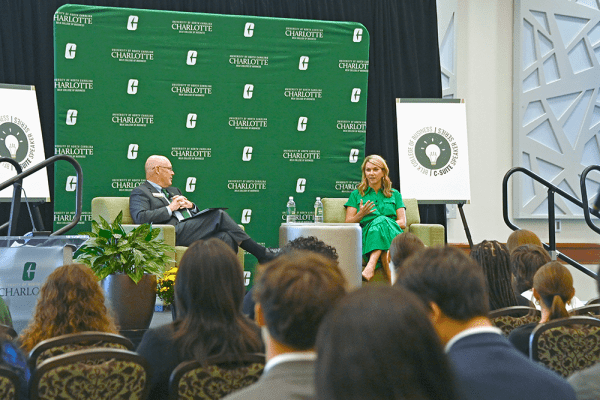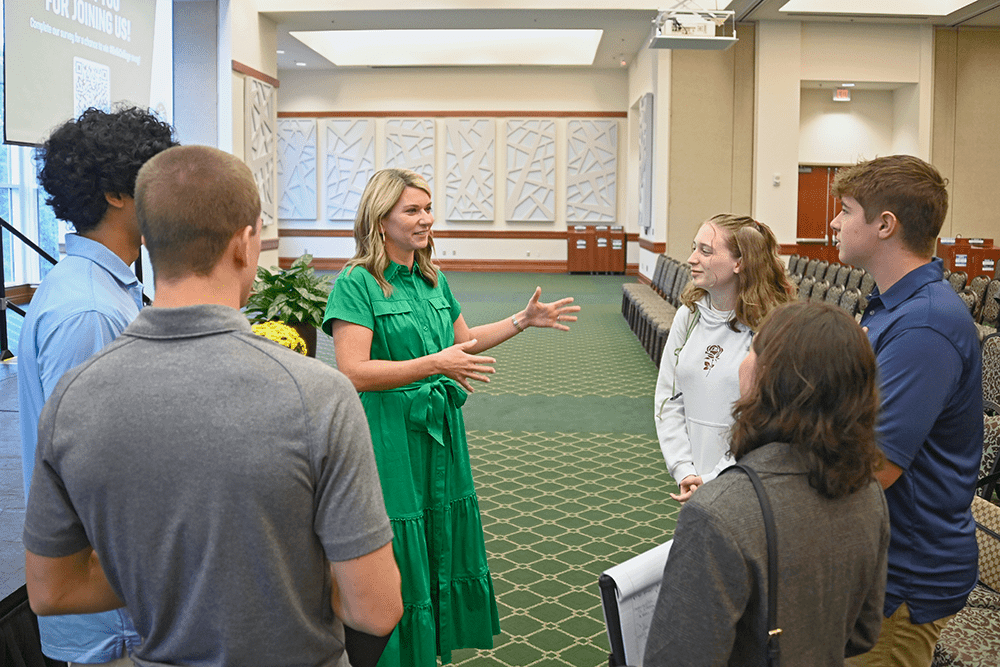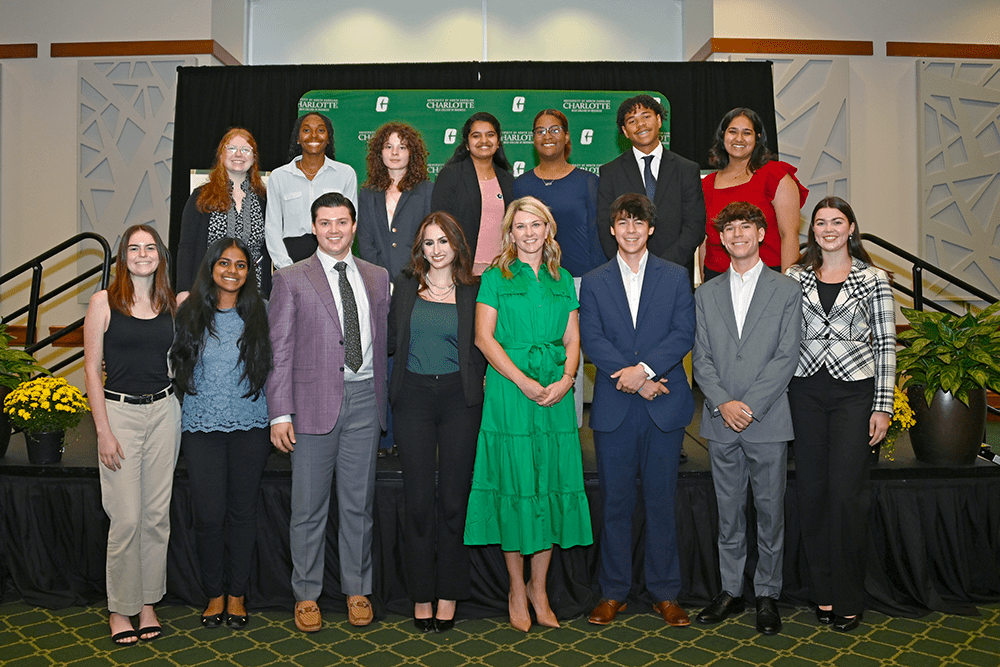A leadership “master class”

Ally Financial’s Ali Summerville joins Dean Richard Buttimer at the fall 2024 C-Suite Speaker Series, offering career and life lessons for Belk College students.
Do It Right. While this short phrase seems simple on the surface, for Ally Financial Inc., its deeper meaning underpins everything the company does.
“Fundamentally, as we go through every decision-making process at Ally, we hold these three words core to how we make a decision,” said Ali Summerville, business administration executive with Ally, while talking with 200 Belk College of Business students on Tuesday, Sept. 24.
“Sometimes our decisions aren’t always the absolute best for the bottom line (immediately),” Summerville said. “But if we take a step back, we believe if we’re taking care of our employees, they will take care of our customers and therefore our bottom line will see the result. We believe that by doing things right, we really will serve our customers well, and ultimately that is what our shareholders want.”
Summerville joined the students, along with a handful of Belk College academic leaders, at the Popp Martin Student Union on UNC Charlotte’s campus for the latest installment of the college’s C-Suite Speaker Series, now in its ninth year. The informal chat, held twice each year, features business leaders sharing career and life lessons in what could be called a master class on leadership.
On this day, Dean Richard Buttimer moderated as Summerville illuminated for students the concepts of corporate citizenship, Ally’s evolution as a leading digital financial services company, life-career balance, the building of trust and other issues that leaders in the C-Suite commonly face. Questions from students helped guide the conversation.
Students envision the future

“The C-Suite chat gave us a glimpse into the perspective of someone who has succeeded in their professional path,” student leader Jayson Richardson said. “As students, we learn the technical knowledge for our desired careers, and then events like this remind us that intangible skills are just as important to have a prosperous career path. Career paths are rarely linear, so the actions taken at each point along the way determine the career path. My most important takeaway from this event is that to be successful, I need to give my best effort in all of my work.”
Student leader Andrew Walford observed that the session allowed participants to hear real-life experiences that can inspire them as they create their own futures.
“One of the most impactful things I heard,” Walford said, “was the idea that asking for help is not a sign of failure but a necessary step in personal growth. Being transparent and upfront with those around us builds trust, and having a generous spirit often leads to mutual success and fulfillment. Her emphasis on leading by example and maintaining credibility also resonated with me. As I prepare for a career in dentistry, where trust and leadership are critical, these lessons will help me foster stronger relationships with colleagues and patients.”
In her current role with Ally, Summerville connects with business and functional leads on behalf of the CEO’s office on enterprise-wide business initiatives. This includes managing and implementing executive leadership routines and seeking organizational efficiencies that advance Ally’s strategic objectives. She also oversees the company’s corporate workplace team, leads the company’s corporate citizenship and community relations efforts and serves as board chair for the Ally Charitable Foundation.
Summerville’s extensive community involvement includes serving on the Executive Committee and as chair for the Charlotte Regional Business Alliance.
She was appointed to the Board of Trustees at Central Piedmont Community College in 2023 and is chairman emeritus for Charlotte Wine and Food. She also serves on the Investment Advisory Committee for the Charlotte Housing Opportunity Investment Fund and formerly served as board chair for Habitat for Humanity Charlotte Region. In 2021, she was recognized with the Charlotte Business Journal’s Women in Business Achievement Award for making a mark in her career and her community. She’s also been named one of the Most Influential Women in Mecklenburg County and is a recipient of Career Mastered magazine’s Leadership in Action Award.

“Be open-minded about what your career path might look like. Work hard. At the end of the day, success is not going to land in your lap. You might catch some breaks along the way, but you’re still going to have to work hard. They say you are not lucky; you’re prepared at the right time. I would say keep that in mind.
Also, stay humble. There’s a real balance between being confident and being arrogant, and I think a humble confidence is really important. You’re not always going to be the smartest person in the room. If you can recognize that but figure out who to surround yourself with so that collectively you have the smartest team, I think that’s the true key to success.”
Ali Summerville, Ally Financial Inc.
Here are a few of the questions and answers from the C-Suite session, with edits for clarity and brevity.
Q: In one aspect of your role, you focus on improving efficiency across the company and making sure the bank’s executives have the right tools to work well together. Can you talk about how your team works to create these improvements and navigate change management?
A: I think it’s about building trust and credibility through all partners that allows you to come with positive intent. That way, you can also have much more free flowing conversation. If we’re all trying to get to the same goal, while some people might have a different way that they want to get there, we can talk it through, with trust.
Q: Can you share more about Ally’s environmental, social and governance initiatives?
A: We have a very strategic focus in our corporate citizenship to support upward economic mobility for all. That could mean for our customers; it could mean for our employees; and it could mean for our communities. The corporate citizenship role is particularly focused on what we are doing in our communities. We’ve taken the approach of focusing on three pillars, within support of economic mobility, which are financial education, workforce development and affordable housing. We chose those because those are really things in which we have expertise, and we can really move the needle.
Q: The Ally Charitable Foundation, which formed in 2020, has invested over $58 million in three years. Talk about the Foundation’s investments in the three pillar areas.
A: We are very fortunate that we have had economic prosperity, and the parent company was able to make an investment in our foundation, which built up our endowment. Our endowment now is over $70 million. We want that money to grow so it’s important for us to balance how we’re spending it. Also, it’s a tribute to the leadership of the entire company that when we have had profitable years, leadership has made sure that we have invested in our communities.
Q: In 2023, the Ally Charitable Foundation made its first mission-related investment in Housing Impact Fund II, led by Erskine Bowles, Nelson Schwab and Ascent Housing in Charlotte. Why is investing in the Charlotte community important to the Foundation?
A: We have two hometowns of Charlotte and Detroit. Our biggest employee base is here in Charlotte. Close to 3,000 people work for Ally in Charlotte. It’s important for us to have a community where our employees have a good quality of life. It’s not only about our employees; it’s about their neighbors and their friends. So, that focus is very important.
The affordable housing crisis that we’ve all experienced, or at least been witness to, can have a huge impact on economic mobility. I served for a long time on the Habitat for Humanity board, and I’m a firm believer that having a roof over your head allows you to go to work, which then allows you to take care of your family. The statistics are really strong that show an affordable place to live really catapults people. It’s a generational change.
Q: Think back to a time when you were a college student pursuing a bachelor of science in business administration. Reflecting on that time, what are things you wish you knew then?
A: I’ve often said that I don’t live with regret. That being said, I would probably have encouraged myself to get out there earlier in my career and be a little bolder.
Q: Did you envision yourself as an executive when you began your career? If not, what was your aspiration?
A: I’ve never been one of those people with a five-year or 10-year plan. I’ve always been someone who says, “I’m going to put my head down. I’m going to do the best job I can, and I’m going to trust the people around me.” I’ve always been very satisfied with that. It’s never been about a title for me. It’s been about if I find satisfaction in the work that I’m doing — and clearly I do.
Q: When you think about your career, what was most impactful to you in various periods, and why?
A: Early in my career, I was in much more of a quantitative type role, which I think was fundamental to understanding the company. I was at Bank of America for those nine years, and it was really such an educational experience and learning how to connect the dots. The next step was that phase of moving into GMAC/Ally, where I was really charged with building out the team that was needed to replicate what I had learned in my early career. I needed that previous experience of understanding what those financials look like to be able to know who to hire to put in those seats.
I’ve often equated that the career trajectory is like LEGO® building bricks in that you don’t build LEGO bricks straight on top of each other. You sort of put some here and then you cross them over, and you move up and you sort of make your way over. A career trajectory is very rarely a straight linear path. I would say if that’s what you think needs to happen, you’re probably going to close your mind off to some opportunities that may come off to the side that may actually propel you in an entirely different direction than you expected.
Q: What other professional or personal experiences have helped shape your leadership perspective and how you make decisions today?
A: I think that especially the nonprofit board service has helped me be a well-rounded thinker. It always grounds me in the reality that there’s this world outside of these tall towers in Uptown Charlotte. I think always having that perspective of understanding things outside of my day-to-day job, while it can be time-consuming, helps me make more holistic decisions.
Q: You currently serve on the executive committee and as chair of the Charlotte Regional Business Alliance. What should students in the Belk College know about the Alliance and how it advances the Charlotte region?
A: When we talk about economic development, the alliance is really a group that helps bring business to our region. If there’s a company looking to move their headquarters or add more jobs here or relocate, an economic development group would help support that and pull the resources together that might be needed to do that. We advocate for public policy at the local level or at the state level for things from which businesses locally will benefit.
We’re trying to get funding for transportation on the ballot, and so that’s a great example of where the alliance has stepped in to try to pull business leaders together to speak about the importance of transportation in our region and how critical it is to moving our region forward because we need to be able to move people from where they work to where they live.
Q. What skills are essential for becoming a successful business executive and how can students start developing them now?
A: Communication is incredibly important. That means truly listening, and then being able to articulate a response. It’s something you certainly can work on while you’re still in school. I had a business communications class when I was in college, and I still look back on that. Every time you craft an email you have to be so careful in every word that you say and the balance of the tone. If you don’t have those skills, it can make or break a first impression very easily.
Q: What advice do you have for recent graduates hoping to stand out in their first job?
A: I see a lot of young professionals get tripped up by the feeling that they have to act like they already know everything, but I actually think that’s the worst possible thing you can do. Don’t be afraid to ask questions, but show that you’re understanding the answer when you are asking a question. I do think as a young professional the most influential part of my life was sitting together learning and from overhearing my colleagues talking to their business partners. It’s a little bit like learning by osmosis, but that is highly important. It might seem lovely to be able to work from home a lot, but for a young professional I don’t recommend it. Obviously, you need to have a well-balanced life, but the best thing you can do in your career is to be present and learn from those around you.
Q: What are the top three pieces of advice you would give to have a successful life?
A: Surrounding yourself with good people is the most important thing, people who will lift you up and not tear you down. That could be at work, but it also is very important in your personal life. Be true to yourself and have credible communication. Keep an open mind and surround yourself with good people.
Q: What was the hardest step you had to take to get to where you are today?
A: Back in the day, I quite frankly had hit a burnout point. It was late nights every single night of the week, and I was exhausted. But I was on track to run the whole team. I had a very honest conversation, communicating that I did not know that this was the right next step for me. I ended up moving into a different, more lateral role that taught me a different skill set that actually made me more prepared to then take another opportunity. I would have been doing a disservice to my teammates if I had taken that job and not had my heart in it, but it was a really hard thing to go and have that conversation.